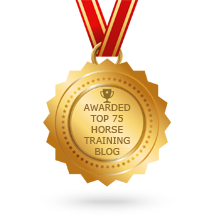|
Animals are learning constantly. The dinosaurs were learning and adapting their behaviour as a result of consequence and association long before humans came along to peer at lab rats in boxes and write papers about operant and classical conditioning and argue endlessly online about quadrants. For this reason, I define “training” as simply “learning that happens in the direct presence of a human”. Broad? Yes, intentionally so. Any time we are interacting with our horses, we are potentially training them. If a human allows a horse to learn that shoving or biting or pinning ears is an effective way of getting what they want, then it is not deliberate training on the part of the human but it is training nonetheless. As the incomparable Dr Susan Friedman says, "Reinforcement is a natural process like gravity - it's in effect whether or not you notice it and make good use of it". Most of you reading this have handled and/or ridden horses for years, or decades, and thus have spent an equal amount of time TRAINING those same horses. That training is not always deliberate, or conscious. Whether on the ground or in the saddle, we may well be getting good results, and yet often we still don’t truly know WHY it is working (or not working, as the case may be). I say “we” because this was me, from when I got my first pony as a child and on right through the next 10 years or so, despite plenty of coaching and relative success in both dressage and show jumping. I was working on gut feel and instinct, combined with some basic “recipes” given to me by instructors.
It doesn't matter at all that I didn't know the proper terms for what it was I was doing, what matters is that it worked. However, I lacked clarity about why it worked and how I might apply the same principles to different scenarios or different horses or different training problems. Looking back, it feels like I was operating in a bit of a fog, riding and training quite effectively, but without a conscious understanding of how I was doing it. After teaching many hundreds of humans to train their horses and dogs, I believe this is the way many (or perhaps most) people are, to some extent. The thing is, if we don’t have the ability to observe and analyse behaviour, and a clear understanding of how to gain the animal's cooperation to influence that behaviour, then we’re missing out on the real magic. There’s plenty of instructors that can teach you HOW to achieve a certain outcome, just as I can buy a recipe book and bake quite a good cake by following the instructions exactly. But I don't understand the science behind baking. I can't invent a recipe, or substitute important ingredients. I don't know why one recipe calls for 1 tsp bicarb soda and another one calls for 2 tsp of baking powder, and if my scones end up hard as a rock I don't always know what to do differently next time to fix it. We can learn specific techniques to fairly reliably get our horse to back up, or go in a “frame” before a dressage test or get him over a jump etc, but it is understanding the WHY of learning that enables our efforts to be more efficient, repeatable, and transferable to other horses and other behaviours. And importantly, this is also what enables us to train ethically and consistently, with clear communication in both directions, and ultimately giving our horse the best chance of succeeding each step of the way. And that right there is the foundation of true partnership and trust.
I want to pass on some tips at this point, in case you feel like you're experiencing a bit of fog yourself, or if you have students or friends who could do with some blue skies and clarity.
Get your hands on as many different animals as you can! The video above is of an impromptu training session with a friend's new kitten. The photos below are from the multi-species clinic I ran last year at Bullswool Farm Park. Training other species is an opportunity to improve technique, cement concepts and underlying training principles, and makes us more creative and flexible as trainers. What experiences have you had that have caused those "pennies to drop from the heavens"? Have you got any tips to share on how to help lift the fog and start having more clarity and consciousness around the training that is happening every time we interact with our horses? Leave a comment below!
'til next time, xxBex
1 Comment
7/1/2018 11:51:47 am
A most important post, Bex. You have a most engaging writing style and I loved the comparison with cooking.
Reply
Your comment will be posted after it is approved.
Leave a Reply. |
Subscribe now!Stay in the loop - blog posts, latest news and educational opportunities! Thank you!You have successfully joined our subscriber list. AuthorBex Tasker Archives
March 2020
Categories
All
|











 RSS Feed
RSS Feed